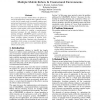Free Online Productivity Tools
i2Speak
i2Symbol
i2OCR
iTex2Img
iWeb2Print
iWeb2Shot
i2Type
iPdf2Split
iPdf2Merge
i2Bopomofo
i2Arabic
i2Style
i2Image
i2PDF
iLatex2Rtf
Sci2ools
119
click to vote
ICRA
1998
IEEE
1998
IEEE
GRAMMPS: A Generalized Mission Planner for Multiple Mobile Robots in Unstructured Environments
For a system of cooperative mobile robots to be effective in real-world applications, it must be able to efficiently execute a wide class of complex tasks in potentially unknown and unstructured environments. Previous research in multi-robot systems has either been limited to relatively structured domains or to small classes of feasible missions. This paper describes a field-capable system called GRAMMPS which addresses this problem by coupling a general-purpose interpreted grammar for task definition with dynamic planning techniques. GRAMMPS supports a general class of local navigation systems and heterogeneous groups of robots, providing optimal execution of missions given current world knowledge. Simulation runs illustrating the capabilities of this system are provided. Results showing successful runs of this system on two autonomous off-road vehicles are also given.
Autonomous Off-road Vehicles | Cooperative Mobile Robots | General-purpose Interpreted Grammar | ICRA 1998 | Robotics |
| Added | 04 Aug 2010 |
| Updated | 04 Aug 2010 |
| Type | Conference |
| Year | 1998 |
| Where | ICRA |
| Authors | Barry Brumitt, Anthony Stentz |
Comments (0)

